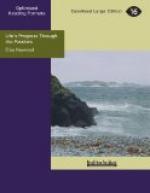What Natura felt at finding so much of what he had done revealed to his father, was greatly alleviated, by perceiving that the main thing, his engagement with Harriot, was a secret to him:—he did not fail to make large promises of being a better oeconomist, nor to express the most dutiful gratitude for the pardon the good old gentleman so readily offered; but this he told him was not sufficient to deserve a re-establishment in his favour, he must also give him a faithful account by what company, and for what purposes he had been induced to such ill husbandry; ‘for,’ added he, ’without a sincere confession of the motives of our past transactions, there can be little assurances of future amendment.’
Natura to this only answered, that it was impossible to recount the particulars of his expences, and made so many evasions, on his father’s still continuing to press his being more explicit, that he easily perceived there would be no coming at the truth by gentle means; and therefore, throwing off at once a tenderness so ineffectual, he assumed all the authority of an offended parent, and told the trembling Natura, that since he knew not how to behave as a son, he should cease to be a father, in every thing but in his authority:—’be assured,’ said be, ’I shall take sure measures to prevent you from bringing either ruin or disgrace upon a family of which you are the first profligate:—this chamber must be your prison, till I have considered in what fashion I shall dispose of you.’
With these words he flung out of the room, locking the door after him; so that when Natura rose, as he immediately did, he found himself indeed under confinement, which seemed so shameful a thing to him, that he was ready to tear himself in pieces:—it was not the grief of having offended so good a father, but the disgrace of the punishment inflicted on him, which gave him the most poignant anguish, and far from feeling any true contrition, he was all rage and madness, which having no means to vent in words, discovered itself in sullenness:—when the servant to whom he intrusted the key came in to bring him food, he refused to eat, and could scarce restrain himself from throwing in the man’s face what he had brought.
It is certain, that while under this circumstance, he was agitated at once by every different unruly passion:—pride, anger, spleen, thinking himself a man, at finding the treatment of a boy, made him almost hate the person from whom he received it.—The apprehensions what farther meaning might be couched in the menace with which his father left him, threw him sometimes into a terror little different from convulsive;—but above all, his impatience for seeing his dear Harriot, and the surprize, the grief, and perhaps the resentment, he imagined she must feel on his absenting himself, drove him into a kind of despair.
In fine, unable to sustain the violence of his agitations, on the third night, regardless of what consequences might ensue from giving this additional cause of displeasure to his father, he found means to push back the lock of his chamber, and flew down stairs, and out at the street-door with so much speed, that it would have been impossible to have stopped him, had any one heard him, which none happened to do, it being midnight, and all the family in a sound sleep.




